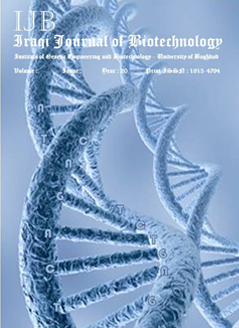Association of Androgen Receptor Gene Polymorphisms at three SNPs and their Haplotypes with Severe Oligozoospermia Risk in Iraqi Patients
Abstract
Infertility in otherwise healthy males be caused by a variety of disorders. These include acquired, as well as heritable conditions. Genetic causes of male infertility are of special interest to reproductive biology, because these disorders can be passed on to the offspring, single nucleotide polymorphisms are considered as one of reason of male infertility Androgens are critical steroid hormones that determine the expression of the male phenotype. Their actions are mediated by a single androgen receptor (AR) which, upon ligand binding, translocate to the nucleus to regulate the expression of androgen-responsive genes. Mutations in androgen receptor gene may lead to a disturbance in the function of the androgen receptor which, in turn, can lead to several forms of infertility. The aim of this study was to determine the frequency of rs962458(SNP1), rs6152(SNP2) and rs2361634(SNP3)and test their associations with severe oligozoospermia risk .This study was conducted using 50 severe oligozoospermia patients and 50 apparently healthy subjects (Control). The frequency of GA genotype of SNP2 was significantly (p≤ 0.05) increased in patients versus control (10 and 0%, respectively, OR=0.561, X2=4.329),while the frequency of GG genotype of SNP2 was significantly (p≤ 0.01) decreased in patients versus control(84 and 100%, respectively, OR=0.871, X2=6.524). The results of TAA and TAG haplotypes were not significant. The frequency of TAG/TAG haplotype combination was significantly (p≤ 0.01) decreased in patients versus control(78 and 100%, respectively, OR=1.072, X2=8.35),while TAG/TAA haplotype combination frequency was significantly (p≤ 0.05)increased in patients versus control(14 and 0%,respectively, OR=0.664,X2=4.69). In conclusion, both GA genotype of rs6152A>G and TAG/TAA haplotype combination may be correlated with severe oligozoospermia risk in Iraqi patients.


